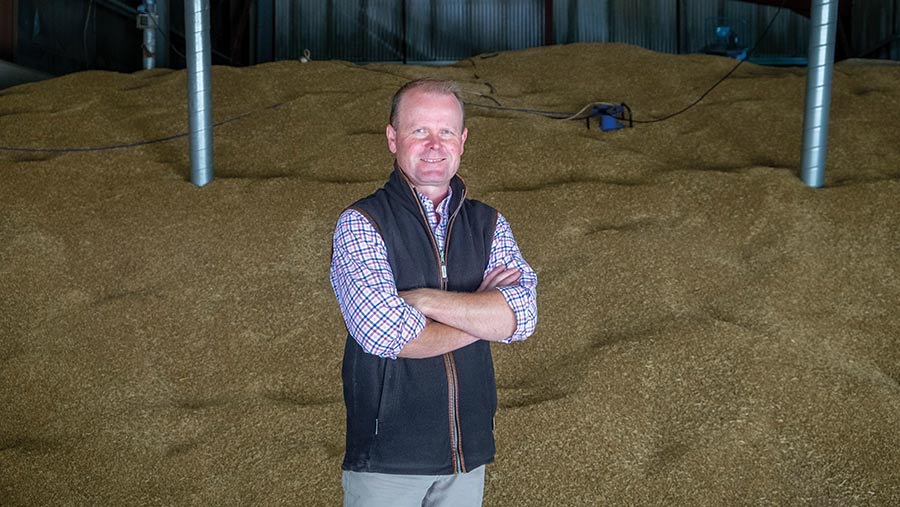Farmers Weekly Awards 2021: Farm Manager of the Year
 Edward Vipond, Farmers Weekly Awards 2021 Farm Manager of the Year © Jason Bye
Edward Vipond, Farmers Weekly Awards 2021 Farm Manager of the Year © Jason Bye Edward Vipond, Troston Farms, Stanton, Suffolk
Edward Vipond runs a profitable and expanding business, and he has had to manage much change at Troston Farms.
The acreage has increased by more than one-third in three stages since he joined six years ago, on soil types ranging from heavy clay to Breckland sand.
Significant blackgrass problems and poor soil structure were the immediate challenges, with inappropriate machinery and cropping having contributed to both issues.
Edward’s wholesale changes to rotations have seen oilseed rape, sugar beet and forage rye removed from the light land, with sunflowers and milling rye replacing these to reduce risk.
He also moved to hire purchase with extended warranty to secure the running costs of the main kit.
Maintaining soil organic matter is another issue which is being addressed by a straw-for-muck agreement with a local pig producer, digestate and pig slurry applications.
Farm facts
- 1,542ha arable across four farm sites 24 miles apart
- Grows milling and feed wheat, feed and malting barley, milling and feed rye, spring beans, sunflowers, maize for AD
- 110ha let on annual licence for potatoes and onions
- Three full-time farm staff, harvest student
- Two Mid-Tier Countryside Stewardship agreements
Risk management
An average arable gross margin of £943/ha across the four farms is testament to Edward’s meticulous approach.
Cropping the light land is a carefully calculated risk, with sunflowers added as a low risk in cost terms and producing a gross margin of £747/ha in 2020.
Cover- and catch crops have been introduced to maintain a green cover through autumn, also reducing wind and water soil erosion.
When it comes to marketing, added value is a priority and an important part of the risk-management plan.
Contracts with Ryvita, Warburton’s, local pet food manufacturers and bird feed suppliers, as well as anaerobic digester feedstock customers are all part of this.
Edward sells one-third of his grain before harvest, more if the market makes him comfortable in doing so. Benchmarking by Andersons shows his long-term marketing strategy has achieved good average prices.
Keen to contribute to shaping future environmental policy, Edward is taking part in the Sustainable Farming Incentive pilot.
While the acreage he manages may expand further, he is open about the prospect of possibly not cropping up to 25% of the land, given the climate risk and the reduction in support.
Innovation
Edward runs trials on seed rate, nitrogen efficiency and urea inhibitors with Ryvita, as well as in-house variety trials and new-product agrochemical trials.
The 40ha of sunflowers are grown for supplementary feeding mixes in Countryside Stewardship schemes, but the next stage of added value is to experiment with pressing the seed for oil or dehulling it and selling the kernel.
The team of three full-time farm staff have seen changes since Edward’s arrival, including a switch from salary to a wage plus overtime, their inclusion in discussion of the challenges and objectives for the farm, as well as breakfast meetings off farm, providing a forum for issues to be raised and suggestions to be made.
Staff input on specifications and options for major machinery purchases, which are trialled on farm, encourage a sense of ownership and improve maintenance.
Edward participates in many activities to get farming’s message across, including Open Farm Sunday, the Tractors for Schools initiative and the Suffolk Farm School Fair. A regular contribution to the parish magazine provides a “view from the farm”.
Winning ways
- Huge commitment to the business
- Consistent performance of crop yields in periods of expansion
- Attention to detail and proactive approach to agronomy, soil health and grain marketing
- Introduced changes to include and motivate staff
- Good margins from sunflowers, with plans to add further value
- Forward-thinking approach to achieve well-integrated operation
A word from our independent judge
Edward has implemented a change in cropping approach alongside rapid expansion, managing risk well throughout. Always seeking improvements, he runs a range of trials and plans to add further value to crops, also finding time for a wide range of public-facing roles.
Andrew Robinson, farm manager, Heathcote Farms
Our other finalists were:
- Tom Chanter, FWS Carter & Sons, Woodbury Salterton, Devon
- Jake Freestone, Overbury Enterprises, Overbury, Gloucestershire
The Farmers Weekly 2021 Farm Manager of the Year is sponsored by Safety Revolution

Farmers Weekly’s farming awards celebrates the very best of British agriculture by recognising hard-working and innovative farmers across the UK.
Find out more about the Awards, the categories and sponsorship opportunities on our Awards website.
